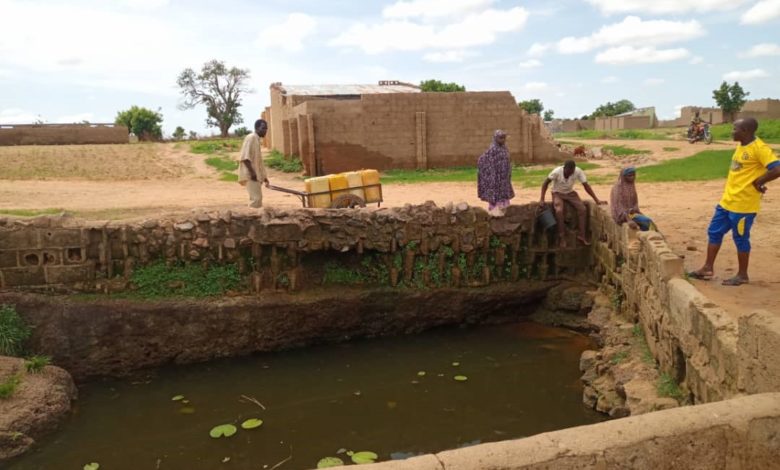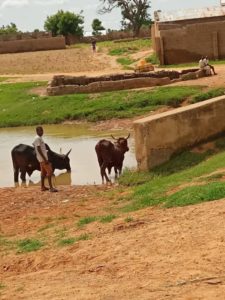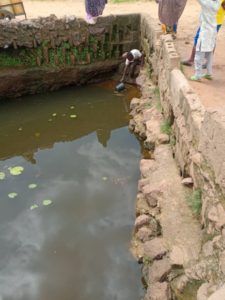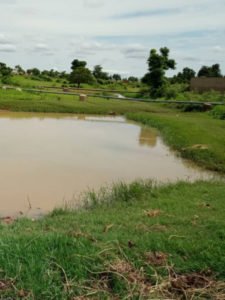Residents Of Gwaram LGA In Jigawa State Plead With Government To Provide Hygienic Water

In many Nigerian states, the absence of potable water is an experience which the citizens have had to endure.
Due to the absence of public water supply, the citizens either resort to using untreated water from private boreholes dug indiscriminately at the risk of the environment or rely on streams, ponds, streams and other unsafe natural sources.
In 2017, it was estimated that 67 per cent of Nigeria’s population had access to water but only 19 per cent could access clean water.
The worrisome, touching but untold story of water scarcity in Gwaram community in Gwaram Local Government Area in Jigawa State attracted the attention of HumAngle.
The situation leads to water-borne diseases such as diarrhea, cholera, guinea worm infestation, among others, on the citizens.
Gwaram people living in the remote part of Jigawa State near the boundary with Bauchi State in northeastern Nigeria, usually travel long distances to get dirty water from Injiri stream few kilometres away, for their daily domestic use.
The community had a water plant which has stopped functioning and an effort to revive it four years ago stalled. Because of the abandonment of the rehabilitation project and failure to respond to their appeal for remedy, the people are angry and describe the state government as a failure
Some residents bared their minds on the situation to HumAngle
Lawal Garba, a Ward Head in Tsohuwar Gwaram village, said “we are facing a serious water shortage in this village.
“Before, the village had water when the population was low. Quite unfortunately distribution of water became once in three days, then it later turned to be once a week but currently there is no water supply at all. Due to difficulties we have to use the stream which is situated close to our village, we are in a serious problem of water scarcity.
“The tragedy about the water scarcity is that we have to move three kilometres to our neighboring village to buy water from vendors. They sell 25kg of water N50 instead of N10.
“Sometimes if you call a water vendor and he realises your house is far away and he sees someone closer, he sells the water to him. Sometimes you have to call more than five vendors before you can get water.
“It is only during rainy season we get relief from this problem of water. We are conscious of the fact that bad water can harm us through disease infections, such as cholera, typhoid and others.
“My daughter suffered diarrhea for 40 days. Around 5.45a.m. on a Monday, my daughter passed away, which I think is as a result of unhygienic water that we have been drinking.
Yahya Sule, a member of the community, said: “for about 20 years we have been suffering from water scarcity in the this village. We have only one water plant which is not sufficient for our demands.
“We need at least four water plants. Due to the landmass of this village. sometimes we spend over one month without water. Vendors sell water at high cost to us.
“Residents in this village are now consuming unhygienic water which has affected our activities. We are facing waterborne diseases like typhoid.
“We are calling on the government to come to our aid, expand Gwaram Water plant and put it under the supervision of Ministry of Water Resources.”
Abdullahi Dauda Gwaram said “We get water from Injiri stream, a contaminated water source with unwanted particles. The large population in Gwaram now causes water scarcity.
“Past administrations made efforts towards the issue of water scarcity in Gwaram but all effort fell apart. Villages like Auyukawa in Gwaram have no challenge with water, some part of Gwaram have access to water while some other parts do not.
“The need for water has increased due to the fact that most houses nowadays use modern washrooms than the latrines. People are suffering, most especially during dry season. During rainy season we get water from vendors at N20 per 25kg but whenever it is dry season we buy water at N50 per 25kg which is costly and to get the water is hard.
“Of recent, the Jigawa State government brought two pumping 150KVA engines while the previous government brought two 100KVA engines which makes it four pumping water machines in the whole of Gwaram.
“If the pumping machines are functioning properly, the issue of water scarcity would have been at its minimal but Gwaram is too big to depend on one water plant.
“We are pleading with the state government and also Minister of Water Resources who is from Jigawa State, Engr. Sulaiman Adamu, we are calling unto him to use his office in order to provide solutions of water scarcity in Gwaram,” he said.
However, Jamilu Mumhamad Gwaram pointed out that “some parts of Gwaram are having water while some other parts are suffering due to large population.
“The issue that caused water problem in Gwaram is not a big issue. Now, the problem is due to insufficient diesel to power the machines that distribute water to our various communities.
“The managing director and other officials from ministry of water resources, Jigawa State, visited the Injiri stream where people are feeding on from unhygienic water and suggested that people should stop using it for any reason.
“Currently we need boreholes, solar water treatment plant and others. As of recent about 15 boreholes were repaired out of the 20 neglected boreholes by the government.”
Meanwhile, Dr Muhammad As-sanusi Zakariyya of Amimu Kano Teaching Hospital explained the risks of consuming unhygienic water.
He said the “Effect of taking unhygienic water can result to infection by micro-organisms. This one has a bio effect on human consumption. Also human fluids and faeces can cause water to be unhygienic which will result to waterborne diseases like cholera, epidemic disease. It can also cause liver and kidney failure.
“Unhygienic water also causes nervous system failure, which can be longe term or short term.”
He said that dirty water could cause disease infection, blood in urine, cancer of urinary bladder, cholera and diarrhoea, which could lead to death.
He also said typhoid fever could be transmitted by drinking unhygienic water.
Support Our Journalism
There are millions of ordinary people affected by conflict in Africa whose stories are missing in the mainstream media. HumAngle is determined to tell those challenging and under-reported stories, hoping that the people impacted by these conflicts will find the safety and security they deserve.
To ensure that we continue to provide public service coverage, we have a small favour to ask you. We want you to be part of our journalistic endeavour by contributing a token to us.
Your donation will further promote a robust, free, and independent media.
Donate HereStay Closer To The Stories That Matter








My advice to you is to always keep publishing what you have collected from the people. Do you not add anything out of what you have received from the people.